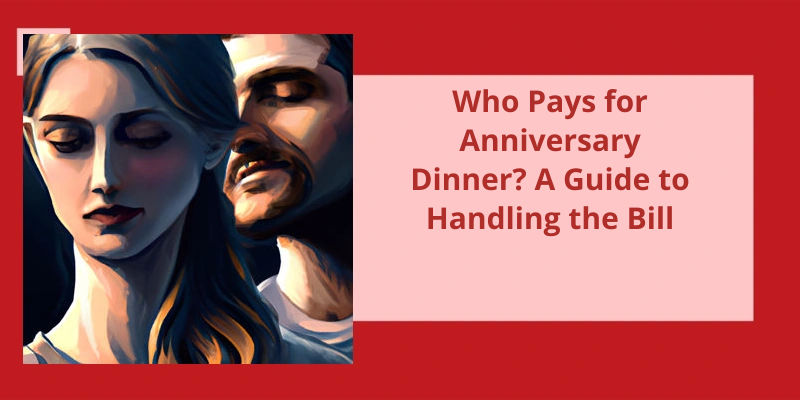Anniversaries are a special time to celebrate the time and commitment shared between two people. As couples commemorate their love and dedication, it’s often customary to go out for a nice dinner. However, the topic of who pays for the anniversary dinner often arises and can sometimes be a contentious issue. While there are various schools of thought regarding this matter, one common perspective is that it’s the man's responsibility to offer to pay for the dinner. This gesture not only showcases his appreciation and affection for his partner, but it also demonstrates his commitment to their relationship. Whether it’s a milestone anniversary or a more casual celebration, the act of offering to pay for the dinner can solidify and strengthen the bond between two people.
Should You Let Your Girl Pay for Dinner?
When it comes to dating, there are a lot of unspoken rules and etiquette that people often follow. One topic that comes up frequently is the question of who should pay for dinner. Traditionally, it’s expected that the man will pay for the meal, but in todays modern world, many couples choose to split the bill or take turns paying. Ultimately, the decision of who should pay for dinner comes down to a few factors, such as who initiated the date, the couples financial situation, and their personal preferences.
If youre the one who invited your date out, it’s generally considered polite to cover both of your meals. After all, youre the one who chose the restaurant and likely picked the menu items, so it’s only fair that you foot the bill. However, this doesn’t mean that your date shouldnt offer to contribute or split the cost. It’s becoming more and more common for couples to share expenses, and theres nothing wrong with agreeing to split the bill or take turns treating each other.
On the other hand, if your date set up your dinner plans, theyll probably be the one to pay for everything. This is especially true if your date is the one who chose the restaurant and made the reservations. However, just like in the previous scenario, it’s still polite for you to offer to chip in or pay for your meal. Even if your date declines your offer, theyll appreciate the gesture, and it shows that youre considerate and appreciate their efforts.
Of course, there may be situations where neither person wants to or can afford to pay for dinner. If this is the case, there are plenty of other ways to enjoy each others company without spending a lot of money. You could opt for a low-cost or free activity like going for a walk, having a picnic, or playing a board game. The most important thing is to communicate openly with your partner and find a solution that works for both of you.
Still, others prefer to have one person pay for everything. Regardless of what you decide, remember that the most important thing is to show appreciation and gratitude for your partner and the time you spend together.
However, what about after the wedding? When it comes to dinner between a married couple, it’s not as cut and dry. The age-old question of who pays for dinner in a marriage can often lead to confusion or even conflict. Let’s explore some different perspectives and possible solutions to this common dilemma.
Who Pays for Dinner in a Marriage?
However, when it comes to everyday expenses within a marriage, such as dinners, the expectations and traditions aren’t as clear. Historically, men were expected to pay for all meals in a relationship, as they were the breadwinners and responsible for providing for their family. This expectation still exists in some cultures and households, but it’s increasingly becoming outdated.
In modern times, the issue of who pays for dinner in a marriage comes down to personal preference and financial situations. Many couples split the bill evenly, while others take turns paying for meals. Some prefer that one person covers most of the expenses, while the other manages other household finances. Ultimately, what works best for each couple will depend on their unique circumstances and values.
One factor that may impact how couples approach paying for meals is their income level. For many families, a joint bank account is the norm and the money in it belongs to both partners. Couples with similar incomes may find it easier to divide expenses evenly, while those with a substantial income gap may need to find a different solution to ensure fairness.
Another factor to consider is the cultural background of the couple. Different cultures may have different expectations when it comes to financial responsibilities in a marriage. For example, in some cultures, it may be customary for the husband to pay for all expenses, while in others, it’s expected that the wife will take on most of the financial duties. It’s important to have open conversations about these expectations early on in a marriage to avoid misunderstandings and disagreements later.
The Role of Gender and Traditional Gender Expectations in Deciding Who Pays for Dinner in a Marriage.
- Gender often plays a significant role in deciding who pays for dinner in a marriage.
- Traditional gender expectations may dictate that the man pays for dinner.
- However, modern couples may choose to split the cost or take turns paying for meals.
- Ultimately, the decision should be based on open communication and mutual agreement between partners.
While this may seem outdated in today’s society, the tradition persists for various reasons, including societal expectations, gender roles, and even personal preferences. However, there are also arguments against this practice, with many advocating for more equitable sharing of expenses in modern relationships. Let’s delve more into the reasons behind this age-old tradition and explore possible alternatives.
Why Is It the Tradition for the Man to Pay Dinner?
In todays modern society, women have a greater presence in the workforce and economic independence, so the idea of a man picking up the check may seem outdated and unnecessary. However, some argue that the tradition is still a symbol of chivalry and shows respect for the womans time and effort in getting ready for the date.
Others view the practice as outdated and rooted in a patriarchal society where men hold the power and financial control. They argue that in a truly equal society, both parties should contribute to the cost of the date.
Despite the controversy surrounding the tradition, it’s still widely practiced, often with the expectation that the man will pay. This expectation can create awkward situations, especially if the woman assumes that the man will pay, but he was not prepared or willing to do so.
To avoid these uncomfortable scenarios, some suggest discussing the financial aspect of the date beforehand, establishing boundaries and expectations. This can also help to prevent any misunderstandings or miscommunications.
Ultimately, the decision of who pays for the date comes down to the individuals involved and their cultural and personal beliefs. While some see it as a sign of respect or chivalry, others view it as outdated and unnecessary in todays society. Whatever the choice may be, communication and mutual understanding are key to a successful and enjoyable dating experience.
Is It Fair for Men to Always Pay for Dinner on a First Date?
- Splitting the cost of the dinner is fair on a first date.
- It shouldn’t always be assumed that men will pay for the meal.
- Women can also offer to pay or split the cost on a first date.
- Paying for dinner doesn’t determine the success of a first date.
- Communication is key in discussing who’ll pay for the meal on a first date.
Determining who pays for dinner can be a tricky situation, with varying opinions on the matter. However, when it comes to traditional etiquette, the responsibility falls on the host to foot the bill. This rule remains steadfast, regardless of the occasion or relationship between guests.
How Do You Decide Who Pays for Dinner?
In most cultural settings, the individual or group who extends the invitation should take responsibility for paying the bill, be it for dinner or any other entertainment event. This isn’t only a show of gratitude to the guests, but it also allows everyone to focus on the experience and shared pleasure of dining out without having to worry about who’s responsible for the costs. Moreover, it’s generally considered impolite to offer to pay for your portion of the meal, unless expressly asked by the host to do so.
Now, while the etiquette of paying for dinner has been traditionally set, the modern world has brought about a shift in the dynamics of couples’ finances. In today’s society, the issue of who pays for dinner has become a topic of discussion among couples both young and old. So, how do you decide who pays for dinner?
Who Pays for Dinner in a Couple?
However, when it comes to a couple, the question of who pays for dinner becomes a little more complicated. Some couples believe in splitting the bill evenly, while others believe that one person should pay for the meal. This decision often comes down to personal preferences and the dynamics of the relationship.
When it comes to larger groups of friends, splitting the bill equally may not always be practical or fair. For example, if one couple orders expensive entrees and drinks, while another couple only orders an appetizer and water, splitting the bill equally could be unfair to the second couple. In these cases, it’s important to communicate openly and honestly with the group about how the bill will be divided.
Regardless of who pays for dinner, it’s important to keep in mind that everyone should feel comfortable and respected. No one should feel pressured or burdened by the financial aspect of socializing with friends or a romantic partner. It’s okay to discuss money and finances openly, rather than leaving it as an unspoken topic of tension.
It’s important to communicate clearly and respectfully with each other, and to prioritize the comfort and happiness of both parties. By keeping these principles in mind, couples can avoid awkwardness and tension when it comes time to pay the bill.
When it comes to dating, who pays for the date can be a sensitive topic. While it’s a tradition for the man to pay for the first date, some may wonder how many more dates they should pay for. Is it gentlemanly to pay for every date or should the woman contribute as well? Let’s explore this further.
How Many Dates Should the Guy Pay For?
It’s crucial to communicate your expectations early on in the dating process so that there are no misunderstandings or hurt feelings later. If you’re unsure about how to broach the topic of splitting the bill, consider bringing it up casually in conversation. For example, you could say something like, “I really enjoyed tonight. Would you like to split the check or should I take care of it?”. This approach is both polite and respectful while also letting your date know that you’re open to sharing costs.
When it comes to paying for dates, there are no hard and fast rules. Some couples prefer to take turns paying, while others prefer to split the bill evenly. Ultimately, the decision should be based on what feels comfortable and fair for both parties. Additionally, keep in mind that financial situations will vary from person to person. If one of you is struggling financially, it may make sense for the other person to cover more of the costs.
If you’re the person paying for the date, make sure to do so with enthusiasm and without any expectations or ulterior motives. If you’re the person being treated, show your appreciation by thanking your date and offering to pay for a future outing. Communication, honesty, and generosity are key to a successful dating experience.
Ways to Split the Bill, Such as Itemized Splitting or Alternating Who Pays.
- Itemized splitting
- Divide evenly among all parties
- Every other person pays
- Individuals pay for their own orders
- Round up and split the difference
- Split based on salary or income
- Use a bill splitting app or website
Conclusion
In conclusion, when it comes to special occasions, it’s important for couples to consider the financial dynamics of their relationship. As a general rule, it’s both generous and courteous for the guy to offer to pay for a celebratory meal, especially if the event is in honor of the woman. However, this tradition isn’t set in stone, and couples should communicate openly and honestly about their finances to determine a plan that works for them both. Ultimately, the most important thing is that both parties feel loved, valued, and appreciated, regardless of who picks up the check.






